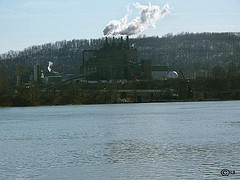
Carbon dioxide is the most prevalent of the greenhouse gases. A by-product of coal plants, CO2 rises up into the atmosphere and traps heat from escaping our planet, thus contributing to global warming. The state of Pennsylvania is the third largest contributor to global warming in the U.S., and alone accounts for 1 percent of the world’s annual CO2 emissions. So if only there was a way of preventing the gas from escaping to the sky we wouldn’t have to worry about how much we produce.
In fact, carbon sequestration does just that. The newest weapon in fighting global warming, carbon capture and storage (CCS) is the act of collecting carbon dioxide emissions from factories and coal plants and pumping it thousands of feet below into porous rock, empty oil fields, and aquifers. The coal industry and the Obama administration both support this brand new technology and have endorsed $3.5 billion to fund the project. Pennsylvania, despite its defiling reputation, is on board to undertake the proposal. Experts say central and western Pennsylvania’s geology can hold about 100 years of carbon dioxide emissions, and with intensive backing the state could be able to locate a site and start collecting carbon by 2015.
Still, there are many obstacles and potential problems with carbon capture and storage. First, it is expensive. Conventional coal plants are not designed to incorporate CCS plants, and there are no CCS plants of commercial size. The process of capturing carbon and pumping it into the ground requires an additional 30 percent more energy, thus creating even more carbon of which it is intended to get rid of in the first place. The sights to store carbon must be thoroughly examined and speculated, taking years to complete. Then there are the dangers of carbon leakage. While CO2 is not considered toxic, groundwater contaminated by carbon could be deadly. Even more dangerous is the potential of a catastrophic carbon escape back into the atmosphere, negating the whole intention of CCS. Pumping so much CO2 underground has many unknown consequences, including earthquakes, and the state would be responsible for all incurred damages under the bill that has been introduced.
Governor Ed Rendell has been supportive of the legislature, which requires electric distribution companies to contract at least 3 percent of their electricity from CCS-utilizing coal plants by 2015. If such a bill were passed, not only would it create many new green jobs but would also give Pennsylvania and the U.S. a strong hold on the potentially globalizing carbon sequestration industry. There are many critics to the plan, stating that such a proposal cannot be achieved in the narrow timeframe due to the unknown nature and risks of the technology. While this could be an advantageous move for the state and nation, it still might be a bit early to ask about carbon sequestration on your next home efficiency checkup.

